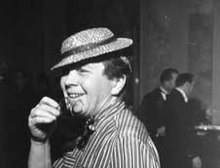Isabel Paterson
| Isabel Paterson | |
|---|---|
 |
|
| Born | Isabel Mary Bowler January 22, 1886 Manitoulin Island, Dominion of Canada |
| Died | January 10, 1961 (aged 74) Montclair, New Jersey, U.S. |
| Occupation | Novelist, journalist, philosopher, literary critic |
| Nationality | Canadian/American |
| Period | 20th century |
| Subject | journalism, philosophy, literary criticism |
Isabel Paterson (January 22, 1886 – January 10, 1961) was a Canadian-American journalist, novelist, political philosopher, and a leading literary and cultural critic of her day. Along with Rose Wilder Lane and Ayn Rand, who both acknowledged an intellectual debt to Paterson, she is one of the three founding mothers of American libertarianism. Paterson's best-known work, her 1943 book The God of the Machine, a treatise on political philosophy, economics, and history, reached conclusions and espoused beliefs that many libertarians credit as a foundation of their philosophy. Her biographer Stephen D. Cox (2004) believes Paterson was the "earliest progenitor of libertarianism as we know it today." In a letter of 1943, Ayn Rand wrote that "The God of the Machine is a document that could literally save the world ... The God of the Machine does for capitalism what Das Kapital does for the Reds and what the Bible did for Christianity."
Born Isabel Mary Bowler in rural Manitoulin Island, Ontario, she moved with her family to the west when she was very young. She grew up on a cattle ranch in Alberta. Paterson's family was quite poor and she had eight siblings. A voracious reader who was largely self-educated, she had brief and informal public schooling during these years: about three years in a country school, from the ages of 11 to 14. In her late teen years, Bowler left the ranch for the city of Calgary, where she took a clerical job with the Canadian Pacific Railway. As a teenager, she worked as a waitress, stenographer, and bookkeeper, working at one point as an assistant to future Canadian Prime Minister R. B. Bennett.
...
Wikipedia
